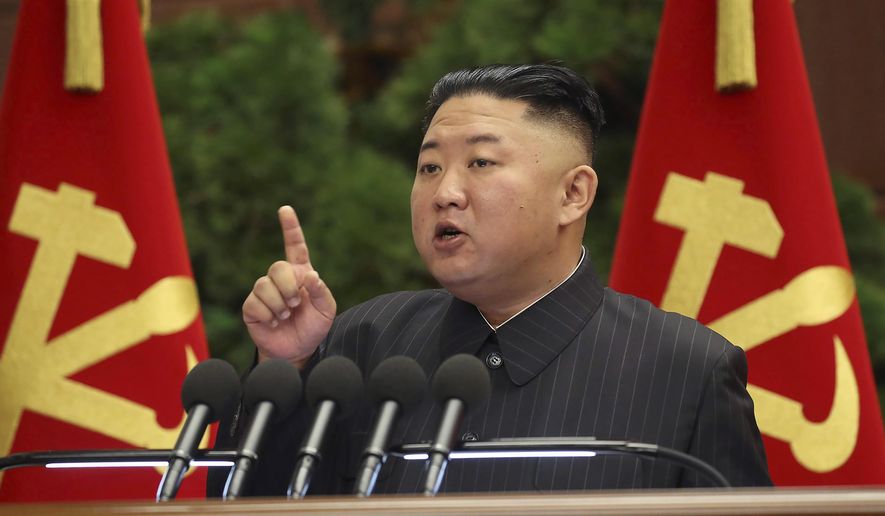A federal religious liberty panel said Wednesday that North Korea’s government “poses an acute challenge” to religious practice in the country, with an organized and intensifying campaign of harassment against an expanding array of faiths.
“Violations of this right in North Korea are ongoing, egregious, and systematic, and they are perpetrated and overseen by the active mobilization of organs” of that government, the U.S. Commission on International Religious Freedom (USCIRF) said in the new report, which noted that pandemic-related border shutdowns have only increased the isolation of North Korea’s still-surviving religious communities.
While Christianity has long been the target of North Korean repression over the past 70 years, experts now say shamanic religion and fortune-telling have been under increased threat since 2018 at the direction of Kim Jong-un, the Communist nation’s dictatorial ruler.
USCIRF officials released a 32-page document outlining brutal repression of religious belief by the Communist regime. The report is based on interviews with those who escaped North Korea, with a majority of those escapes taking place in 2019.
“Religious freedom is indeed nonexistent in North Korea,” declared USCIRF Commissioner Frederick A. Davie, a senior strategic adviser to the president of Union Theological Seminary, who spoke at a briefing introducing the report.
“Religious adherents face severe persecution for practicing and holding their faith and beliefs,” he added.
“The North Korean government exerts absolute control over religion and denies the North Korean people freedom of religion from birth,” noted USCIRF commissioner James W. Carr, a retired administrator at Harding University. “The government severely punishes any forms of deviation from its official ideology and policy with Christians and adherents of shamanism, particularly targeted for the persecution.”
Six Christians were executed in a southern province in 2015, with as many as 40 others sentenced to life at that time, according to Suyeon Yoo, co-director of human rights organization Korea Future, which produced the report. The system “relies on fear of the state, rather than a faith in [Mr. Kim].” She noted that where North Korea had an estimated 250,000 Christians in 1950, that number has dwindled to a few thousand today due to the intense persecution.
Ms. Yoo said COVID-19 lockdowns along the China-North Korea border have stopped any delivery of Christian materials from pastors working along the divide, and restricted contact between those clerics and North Korean believers.
Christians who escape to China are flagged as believers by the Chinese authorities who return captured defectors, setting them up for additional persecution when back in North Korea, one expert said. Many Christian refugees in China are forcibly abducted and returned to North Korea by agents of Pyongyang’s Ministry of State Security.
Said Inje Hwang, a Korea Future investigator who co-authored the USCIRF report, “One Christian victim was nearly beaten to death and left on the floor to be seen by other prisoners.” He added that Christianity is persecuted because of its connections to the West and its emphasis on evangelism. Believers get “severe persecution” within the system, facing either summary execution or a life sentence to a prison camp, Mr. Hwang said.
“The Workers’ Party of Korea enforces the absolute denial of religious belief through the active mobilization of the Ministry of State Security, the Ministry of People’s Security, the Prosecutor’s Office, and multiple organizational units, among other mechanisms, that govern the daily lives of citizens,” the report concluded.
“Accountability is in this respect as much about the process as the end goal. It’s not about targeting North Korea, but upholding international law,” said James Burt, Korea Future’s chief strategy officer, and the other report co-author. He called for a United Nations-invoked trial on the order of the Nuremberg war trials of Nazi leaders and functionaries at the end of World War II.
The panel, an independent, bipartisan U.S. federal government commission created by the 1998 International Religious Freedom Act (IRFA), monitors religious freedom violations abroad and makes policy recommendations to the White House and Congress.
From its interviews, USCIRF identified 68 cases of state prosecution over religious issues. They said, “Shamanic adherents accounted for 43 cases, 24 cases were related to Christianity, and one case was related to Cheondogyo,” a native pantheistic religion.
Ms. Yoo placed the blame for the crackdowns squarely on Mr. Kim.
“We should see Kim Jong-un, the supreme leader, at the top of North Korea’s chain of command,” Ms. Yoo explained. “Below him is the organization and guidance department which holds unchallengeable powers of command and control over all domestic and foreign policies, government institutions, military personnel and party members in Pyongyang [and] in every province, city, county, town, and village.”
From birth, North Koreans are indoctrinated in the state’s “10 Principles,” which Ms. Yoo said “define the standards of loyalty, verification and unconditional obedience to the Supreme Leader,” Mr. Kim. She said the principles “override [the] constitution and criminal code and it dictates all government policy.”
The North Korean state, the report charged, “is the source, the rationale, and the tool for the religious freedom violations” perpetrated there.
Jeff King, president of International Christian Concern in Silver Spring, Maryland, said the report dovetails with the information the religious freedom advocacy group receives.
“The Kim regime has always treated Christianity as its enemy. While the concept of trinity was adopted into its state ideology [of] ‘juche,’ the Kims want the North Koreans to worship no other gods but themselves. A leaked official document distributed in April 2021 which [we’ve] reviewed states ‘currently, South Korea and the United States have been spreading the gospel through leaflets and radio broadcast affecting North Koreans’ minds. They have been spreading a bogus rumor about believing in God and trusting God in all things.’”
• Mark A. Kellner can be reached at mkellner@washingtontimes.com.




Please read our comment policy before commenting.